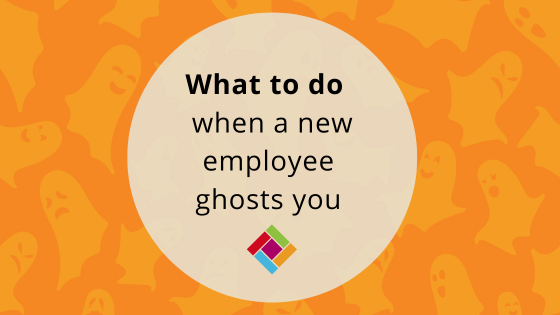
We’re all familiar with the term ‘ghosting’ when it comes to relationships, but it also happens in recruitment. A common issue we’re hearing more about recently is ghosting from new starters. Finding the right talent is a challenge, so when a new hire doesn’t turn up on their first day, stops responding to your emails, texts or calls – it is frustrating. We’re hearing that this is becoming more of a problem, with candidates ignoring the etiquette and simply not showing up. So, why does this happen, and what can you do about it?
Understanding why ghosting happens
Firstly, it’s important to understand why a new recruit might ghost you. There are a few common reasons that creep up:
- They have received a better offer from another employer.
- They have had a change of heart about the role or the business.
- Personal issues or emergencies have prevented them from starting the job.
- Miscommunication issues, in that they had different expectations from you or that the offer / start date wasn’t clear.
Understanding these reasons can help you to develop strategies to prevent it happening in the future, and how to deal with it if it does.
Preventing ghosting
- Make sure your communication is clear
From the very first interaction with a potential candidate, your communication should be clear, transparent and engaging. Every candidate should know exactly what to expect at each stage of the hiring process and what the role involves. This means supplying detailed job descriptions, clear timelines and setting expectations up front during the recruitment process. Read our guide to the recruitment process.
- Create a positive recruitment experience for candidates
Again, this can help reduce the likelihood of ghosting. A smooth recruitment process reassures a candidate and gives them faith in your business. Regularly update candidates on their status and answer any questions promptly that they might have.
- Stay engaged
Once the candidate has an accepted an offer, keep the lines of communication open. Regularly update them and send welcome messages. If there is a gap between the offer acceptance and the start date, check in periodically to maintain engagement and address any issues or concerns they may have. Now is a good opportunity to also send them the company culture book, so that they feel immersed in the business before they even start. Read our guide to creating a culture book on Enterprise Nation.
How to handle ghosting when it happens
Despite your best efforts, and if you have followed the previous steps, we know that ghosting can still happen. Here’s how to handle it:
- Try to reconnect with the candidate
Don’t immediately jump to conclusions if your new recruit misses their first day. Reach out to them through multiple sources including email or phone. Try to discover why they have not turned up for work, there may be a good reason. Make sure your messages are professional and understanding, as there could be a valid reason for their absence. For example, “Hi XX, we notice that you weren’t able to start with us today. We hope that everything is ok? Please get in touch when you can to let us know your situation. We’re here to help if you need support.”
- Put a time limit on it
If you get no response after a few attempts, then set a reasonable time limit for them to get back to you. This can vary depending on your business needs, but a week is typically sufficient. Make it clear to them, that they if they don’t respond within this time frame then you will need to move on.
- Reflect on your hiring process
Were there any red flags that you encountered during the hiring process, or equally that you might have missed? Did you communicate clearly and set our clear expectations? Learning from this experience can help to prevent it from happening again in future.
- Move forward
Once you’ve gone over the set timeframe, and still haven’t received a response, it is time to move forward. Holding onto the hope that the new starter will return will just delay your projects and impact your team’s morale.
Learn and adapt
Ghosting is a frustrating, rude and costly experience. However, it can also be an opportunity to improve things like:
- Onboarding: making sure it’s welcoming and engaging. Read our guide to the onboarding process.
- Gathering feedback: if you can, it’s useful to reach out to the candidate later on down the line to understand their reasons. Constructive feedback can give you insights into areas that could be improved, such as the recruitment process or company culture.
- Strengthening the employer brand: does something need to change with your employer branding to become more attractive to potential employees? This is where your company website can really showcase your organisation, its values and the employee benefits you offer.
Dealing with a new starter who ghosts you is challenging, but it’s not the end of the world. By understanding the reasons behind ghosting and creating strategies to prevent it, you can minimise its impact. When it does happen, responding professionally and using the experience to refine your hiring process can help turn a negative situation into a positive learning experience. Remember, the right candidate is out there.
For support with your recruitment processes or to find out more about outsourcing your HR, please download our sales and pricing brochure here.